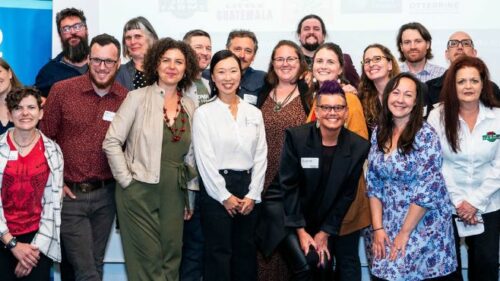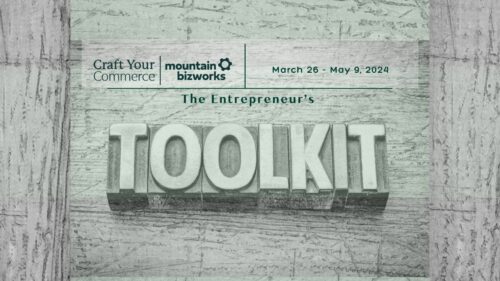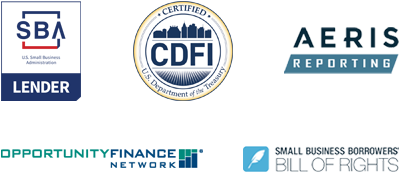 Becky Cannon, founder and president of i play., Inc—and author of Grow Healthy. Grow Happy. The Whole Baby Guide—shares how she took her company from a living-room operation to a thriving, family-owned business.
Becky Cannon, founder and president of i play., Inc—and author of Grow Healthy. Grow Happy. The Whole Baby Guide—shares how she took her company from a living-room operation to a thriving, family-owned business.
Note: The following is a part of ScaleUp WNC’s case study series. Is your business ready to scale? Learn how to participate in future program cohorts.
When Becky Cannon gave birth to her second daughter in the United States after having her first daughter in Japan, she asked her Japanese mother-in-law to mail her cloth diaper covers. She had grown accustomed to the more natural baby products Japan offered, and she didn’t want to give that up while living stateside once again.
It was the early 1980s, and Cannon’s readily available diapering options for her baby were either disposable diapers or cloth diapers combined with pins and plastic pants. A diaper system and baby clothes made from all-natural fibers, such as wool or cotton, just weren’t available in the US at that time. As Cannon searched for items here for her own baby, while receiving those packages in the mail from her mother-in-law, a light bulb went off: “How about offering natural baby products to parents in the states?”
While living in Japan, Becky worked at a kindergarten that focused on natural lifestyle and a philosophy that combined Western ideas with traditional Japanese culture and teachings. “It merged modern-contemporary with the traditional,” Cannon describes. The fusion inspired her, and she had the thought to create a similar baby business—one that offered innovative products with a nod to the past.
“I found nifty, practical things made of high-quality materials,” Cannon says. It wasn’t long before she had cooked up a mail-order company in one tiny room of her home. “It’s now a bathroom,” she notes of the room with a laugh, recalling how the entire operation that launched her business—i play., Inc.—began. If she stood in the center of that room, she could touch everything that made up her fledgling company.
“I started the business in 1982—the company is 34 years old, and my children are 36 and 33,” she says. The first product that propelled Cannon down the entrepreneurial path? Not surprisingly, natural-fiber diaper covers made in Japan.
“I didn’t start out as an entrepreneur, and I definitely didn’t intend to go into business.”
From Teacher to Accidental Businesswoman
With a background in child development, Cannon describes herself as the epitome of Michael Gerber’s E-Myth: Why Most Businesses Don’t Work and What to Do About It. The assumption behind his entrepreneurial myth book is that people with tangible business skills are the ones who start businesses. That’s a logical assumption, but not true most of the time. Many companies are started by “technicians” who have no idea how to run a business, and Gerber connects that to the reason most businesses fail.
“I didn’t start out as an entrepreneur, and I definitely didn’t intend to go into business,” Cannon says. “But because of my background, I do have a passion for babies, and I like products, design, and the creative process.”
Although i play., Inc.’s products can now be found globally, the ins and outs of the business and distribution were hard-won lessons for Cannon, who recalls the first time a store in Asheville asked her for an order form. “I said, ‘Huh? What’s that?’ They didn’t have Google then, so I had to learn on my own. You enter a new industry and you have to figure out each step, like natural products and whole foods. Everything has its own terms. We’re starting to do food and that is a new challenge.”
Cannon found her first customers after running an ad in Boston’s East West Journal, a monthly magazine started in the 1970s that covered health, nutrition, psychology, and environmental issues. Eventually, she advertised in other baby magazines and began selling wholesale to catalogues like Garnet Hill and Vermont Country Store.
“We packed diapers in my living room, and UPS came through the front door to pick up the boxes. When my daughters were in junior high, they’d exclaim, ‘Why can’t we be like other people? We always have employees in our house!’” Cannon recalls, reflecting on the beginnings of what is still a family-owned business. For a long time, i play., Inc. only offered Japanese diaper covers, but eventually started adding other mail-order items made in America.
She kept operations and inventory in the garage of her Asheville home for 13 years, while maintaining a staff of five. At that point, sales had almost crested the $1 million mark. Eventually, she moved the business to a warehouse in Asheville on Roberts Street before relocating again to the current location on Riverside Drive. “Now we have 60,000 square feet in the warehouse, and more than 60 employees,” Cannon says thankfully as she looks back at their progress.
“I felt a lot of shame because I still had not turned a profit nearly a decade into business…I couldn’t talk about it to other people.”
Despite the company’s gradual development, during i play., Inc.’s early years, Cannon often felt like a failure because things didn’t always go as planned. “I had several crises over that period. Some worse than others,” she says. “I felt a lot of shame because I still had not turned a profit nearly a decade into the business…I couldn’t talk about it to other people.” Later, Cannon confronted these feelings head-on by sharing her story in a public talk. “It was healing for me to tell my painful experiences.”
Finances were perhaps her biggest challenge then, and the primary contributor to her disappointment with the company. “I was always struggling to get out of debt,” Cannon says. “It was so stressful and I wanted a different life. I tried to sell the business a number of times, just to get peace of mind. I considered going to graduate school or getting another job. But I had invested so much in the business, and I couldn’t sell it for the value of my efforts, so I stayed with it.”
Overwhelmed by the debt, Cannon struggled to make enough money to even pay herself. That may not be a unique story to business owners in their first years, but it can be a problem that seriously tests an owner’s resolve to keep going. “I had payroll checks made out to me that I couldn’t cash, because I did not have enough money,” Cannon shares.
“I started the business with some funds that my grandfather, who was an entrepreneur, left for me when he passed away. Having that money was a plus and a minus—I did not have experience managing money, and because I had not earned it, I had an omnipotent and unrealistic perspective,” she says, adding, “Without backup finances, I learned to become resourceful when I came into crisis. I had to learn on my own and go through my personal experiences.”
The Big Blow and Big Change
Nearly a decade after i play., Inc. began, the outbreak of the Gulf War in 1990 had a negative economic impact on sales—a big blow for Cannon and her business. “Previously, we were getting hundreds of mail-orders a day, and then all of a sudden they decreased dramatically,” Cannon says. “We had a major decline in sales, and we were stocked in inventory to meet previous demands.”
She continues, “We were in a really critical position, and because my background was in human development instead of accounting, I didn’t even realize the extent of the situation.”
It was a sink or swim moment, and she chose to swim—by exploring product diversification. She had a customer who wanted a swim diaper developed, which was not offered by i play. at that time. Yet, it was a perfect complement to their existing products. Cannon found local seamstresses to sew swim diapers in their homes; at one point, they could produce 10,000 swim diapers a week.
This reusable, cloth swim diaper turned the company around. “Sales grew exponentially,” notes Cannon. “When I went back to my accountant four or five months later, she couldn’t believe the financials.” Such ingenuity brought her through a major crisis and provided her company with a more diversified, broader product line and new approach to business.
“I started designing products,” Cannon shares. “We had a fabric cutter in the warehouse on Roberts Street in Asheville. We cut the pieces and the seamstresses picked them up in big black bags to sew at home. We designed and manufactured 15 to 20 different products, partnering with women sewing at home.”
Through this experience, Cannon began to learn the principles of business and the factors necessary to be successful. She realized that with product diversification she could reach a larger market and increase sales. “This was a big turning point for me,” Cannon says.
Shining the Spotlight on Brand, Not Just Product
How does an entrepreneur balance business skills with the values her company stands for? Cannon tries to stay true to her ideals without sacrificing quality and profit. She has had support in these challenges. In the company’s early days, Cannon sought an advisor who had managed children’s apparel plants. “Abe Freedman is a SCORE-type mentor, and still on our payroll—he’s in his 90s!”
Now, Cannon focuses on maintaining quality products, while trying to keep costs low. Her experience helps her make informed decisions because, as she puts it, “By being involved in the manufacturing process, I have learned the basic components in producing a product.”
“With outsourcing, small businesses such as i play. can diversify and grow without the resources we needed in the past to be successful.”
As Cannon’s experience grows, she is able to confidently make decisions in the best interest of her brand. For example, when she recently wanted one of her manufacturers to make improvements to the swim diaper, her supplier resisted. “Since we knew the processes involved, we could negotiate for improvement without increasing costs.”
“Establishing brand has become essential today—a long time ago, having a loom was foundational for success. Eventually, owning a factory was necessary to progress in the business world,” Cannon remarks. “Now, outsourcing is common and we don’t have to own the factory with the support of labor commitment and capital equipment. With outsourcing, small businesses such as i play. can diversify and grow without the resources we needed in the past to be successful. We work with over 25 factories; we design, develop, and monitor our own branded products for quality. The brand has the value now,” Cannon says.
Cannon’s first brand was called “Family Clubhouse” and later changed to “i play.” “We are now building our family of brands—i play. is apparel, which is about movement, connection to nature, and fun,” Cannon explains, noting i play.’s swimwear, sunwear, playwear, and rainwear. Their “green sprouts” line of toys, along with feeding and wellness products, are made from safe materials and focus on whole development, learning, and natural health.
“Building brand is important, more today than ever since I’ve been in business,” Cannon stresses. In that regard, she has a new line set to debut: “grow healthy,” which provides the staples for making homemade baby food, while encouraging parents to use locally grown, fresh vegetables and fruits. Made from sprouted grains, grow healthy will be manufactured in Alabama.
Cannon also believes in taking good care of her employees, paying based on geographical standards of living wages. For a small business, i play., Inc. provides generous health care and benefits, while encouraging a healthy workplace with support for fitness and eating nutritious food.
The company now sells natural baby products throughout the US, and in more than 25 countries. Its workforce has increased from the five employees who met in Cannon’s garage to more than 60 full-time workers. Cannon’s daughter, Emi Kubota, joined the team after earning her MBA from Columbia University. “She gives me regular advice,” Cannon laughs.
When asked about how she cuts costs while still delivering a high-quality product, Cannon says it’s all about thinking creatively in the production process. “We look for solutions that will save money and make a better product. You can be creative in any area to improve your business.”
Taking Steps to Scale
“If you’re at the top of a level and maxing out at that level with lower overhead, there is more available profit.”
Cannon’s success has repeatedly defied the odds against up-scaling small business owners. So how does one grow a company out of their home with $1 million in annual revenue into a large warehouse with 2015 earnings of $17 million? Cannon describes the process required for moving from one level to the next as stair steps: “If you’re at the top of a level and maxing out at that level with lower overhead, there is more available profit.”
“Out of my home, the company was earning $1 million in revenue, and it produced as much as possible within that structure, but to grow to the next level took investment with increased infrastructure and overhead, so the profit went down. When we moved from my home to this business park, i play., Inc. was profitable,” she says, gesturing to her warehouse. “But then our primary distributor went out of business, so we experienced a vertical integration. That required the investment of developing the processes of marketing and selling.”
As Cannon and her team continue to scale, they also continue to encounter business challenges. A company of their size always faces struggles and speed bumps. It may lose suppliers and customers. It may face environmental situations or political crises that halt production. Learning how to cope with these curveballs is part of the game as a company expands operations and scales up.
“We have gained and lost through different situations,” Cannon says, noting that establishing a clear purpose with principles supports commitment and persistence during tough times.
Beyond Running the Business
Purpose and Principles of i play., Inc.
Purpose: Guided by principles, our family-oriented company collaborates with our customers, team members, suppliers, and partners to provide healthy and practical products for babies’ whole development and resources for natural parenting.
Principles:
- Act with intention
- Foster health and happiness
- Be honest and fair
- Connect with nature
- Be open and creative
- Nourish compassionate relationships
- Create prosperity
Recently, Cannon had another triumph with the publication of her first book, Grow Healthy. Grow Happy. The Whole Baby Guide. It took her six years to complete the book, published in October 2014. “I’m working on a website. It’s a cutting-edge website sharing content from the book with i play. products.” For example, if you’re shopping for a teether, along with the product details like materials, the site will also show remedies for teething and the stages of teeth development. In other words, it will integrate information and support surrounding their offerings.
Of the six-year process, Cannon says she dedicated three years of that time exclusively to writing. “It’s amazing, I completely checked out of the business, and it was the best year ever, thanks to my daughter, Emi, and our team!”
Despite these successes, Cannon is continually retooling i play., Inc.’s marketing strategy and main website, which she describe as big challenges. “It’s been an interesting process. I really feel like I’m bringing it down to the core components: restructuring our mission, value statement, the whole product line, our logos, everything.”
Cannon and i play, Inc. have overcome significant obstacles since the company’s founding in 1982. She has successfully transformed her passion for child development, creative and natural products, and innovative design from a living-room operation into a thriving, family-owned business.
Find i play online at iplaybaby.com. Download a PDF of this case study.
Is your business in the scaling up stage like i play., Inc. was—that important and oft-underserved phase after startup but before maturity? ScaleUp WNC is a unique program to help expand growth-oriented businesses and strengthen the entrepreneurial ecosystem across the Western North Carolina region. Learn more, including how to participate in future cohorts, at scaleupwnc.com.




